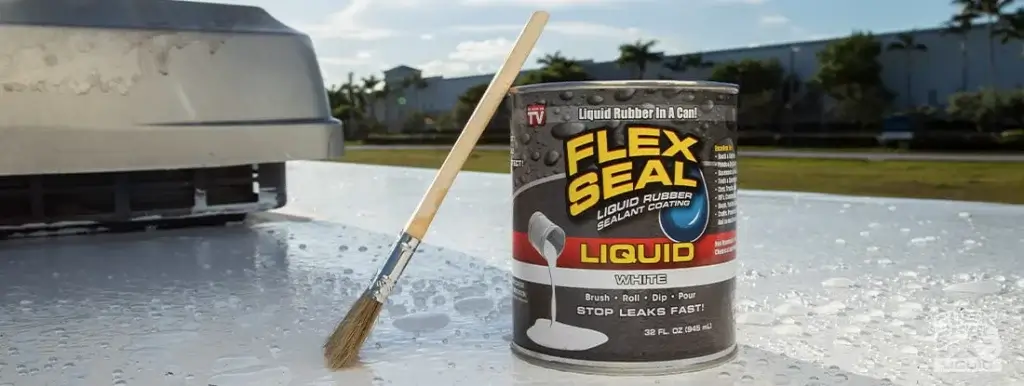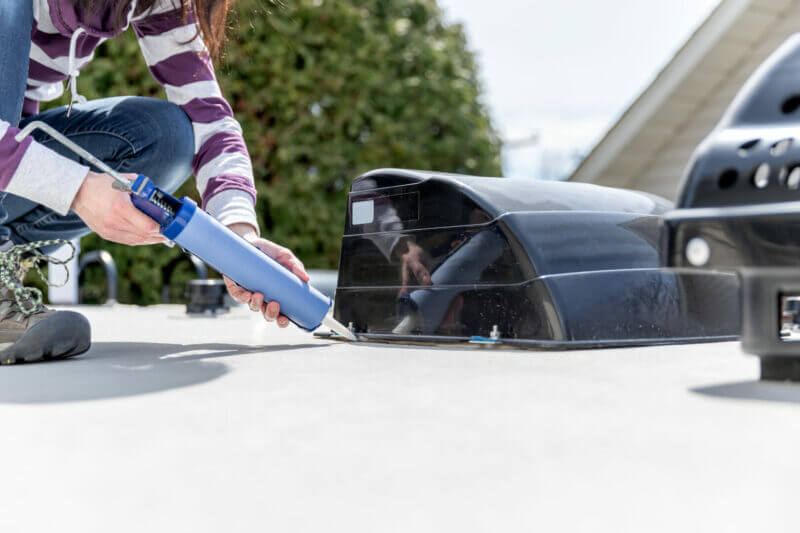As an RV owner, you understand the importance of maintaining and protecting your investment. One important aspect of this is the roof which can be subject to wear and tear and may require regular sealing.
A high-quality roof sealant is crucial in keeping your RV in top condition. With so many options available, it can be difficult to know which sealant will be the most effective and long-lasting.
In this blog post, we’ll share our top picks for the best RV roof sealants on the market to help you make an informed decision and find the best fit for your RV’s needs.
List of 8 Best RV Roof Sealants
1. Dicor EPDM Self-Leveling Lap Sealant
The Dicor 501LSW-1 Epdm Self-Leveling Lap Sealant is a high-quality roof sealant that is designed to provide long-lasting protection for your RV or motorhome. One of the standout features of the Dicor 501LSW is its ability to self-level. This ensures a smooth and even finish that will perfectly seal your roof and prevent leaks. It is also weatherproof, so it won’t crack or discolor even when exposed to harsh weather conditions. Additionally, the Dicor 501LSW is UV-stabilized, reflecting the sun’s UV rays, which helps protect your RV from damage. In addition to sealing your roof, the Dicor 501LSW can also be used to seal around vents, pipes, and your air conditioner, helping to prevent leaks and costly repairs.
2. ToughGrade Self-Leveling RV Lap Sealant
No products found.
The ToughGrade Self-Leveling RV Lap Sealant is capable of sealing along roof edges, around vent covers, vent pipes, air conditioners, and screw heads, making it a versatile choice for protecting various areas of your RV from leaks. The ToughGrade RV Sealant is easy to use and perfect for horizontal surfaces. Apply the sealant to the areas that need protection and allow it to self-level for a smooth, even finish. The sealant is UV-stabilized, which means that it will not deteriorate or discolor over time. This makes it a durable choice that will continue to protect your RV for many seasons to come.
3. Yirilan RV Roof Sealant Tape
The Yirilan RV Roof Sealant Tape is a professional-grade repair tape that is specifically designed for use on RVs and mobile homes. It is capable of effectively stopping leaks and binding cracks, making it a reliable choice for repairing your RV. One of the standout features of the Yirilan RV Roof Sealant Tape is its natural pure white color, which is closer to the color of most RV roofs. This makes it a more aesthetically pleasing choice compared to other sealant tapes that may have a messy patchy look. It is flexible and sticky enough to be shaped around objects, ensuring a secure seal. Once applied, it creates a permanent, ultra-durable, thick rubberized barrier that seals out water and air, making it suitable for a wide range of repair needs.
4. Tough Roof RV Coating kit
The Tough Roof RV Coating kit is a permanent waterproofing solution for RVs. It is designed to instantly fix cracks, leaks, rust, and holes, providing a strong and reliable protective barrier against water damage. One of the best features of the Tough Roof RV Coating kit is that it does not require the use of a primer which saves you the time and expense of applying an additional layer before coating your RV. The Tough Roof RV Coating kit is also one of the toughest options available, with a coating that is over 5 times stronger than other liquid rubber coatings. On top of that, it is highly reflective, with a solar reflectivity of 87%.
5. Liquid Rubber Color Sealant
The Liquid Rubber Color Sealant is designed for a variety of surfaces, such as flat roofs, metal roofs, sloped roofs, and many more. It is highly flexible and durable, with an elongation of over 1000% to prevent adhesion failure. The final membrane is also UV stable which helps to prevent damage from the sun. It is also environmentally friendly. It is water-based and contains no solvents, volatile organic compounds (VOCs), or harmful odors. This makes it safe for humans and pets to use and can be used both indoors and outdoors. You do not need any special breathing apparatus while using this.
6. Dicor Acrylic Elastomeric Coating for Metal RV Roofing
Dicor Acrylic Elastomeric Coating is specifically designed for use on metal RV roofing. It is not recommended for use on EPDM rubber or TPO roofing. The coating is formulated with 100% acrylic elastomeric resins. It creates a rubber-like coating that is able to expand and contract with the movement of the roof. It is available in Arctic white color, which provides superior reflectivity and helps lower interior temperatures. To achieve the best protection, this Dicor Acrylic Elastomeric Coating must be applied in two coats of 1 gallon per 200 square feet per coat. It is important that you follow the manufacturer’s instructions and use the product only as advised because using it on the wrong type of roofing or applying it incorrectly may result in poor performance or even damage the roof.
7. Dicor Corporation Rpselrct1 Signature Extended Life Rv Roof Coating
The next on the list is the Dicor Corporation Signature RV Roof Sealant. t is a 100% silicone roof coating that is permanently flexible and resistant to UV rays and extreme temperatures. This coating is designed to refresh a tired old roof, restoring it to a brighter, cleaner look and helping to extend its life. It dries to the touch in one hour and is walkable in two hours. To achieve proper adhesion to EPDM roofs, it is recommended to use Dicor Rubber Roof Cleaner/Activator. For proper adhesion to TPO roofs, it is recommended to use Dicor TPO Roof Primer.
8. Kohree RV Sealant Tape
The Kohree RV Sealant Tape is made with premium Butyl. This sealant tape offers a self-priming seal and long-lasting usage. It is specially designed to protect your RV from extreme weather conditions and leakages. It is a strong adhesive, and its UV-resistant properties make it resistant to moisture and corrosion. This ensures that your RV’s roof remains in good condition. It can be used on a variety of materials, including Metal, EPDM, PVC, and TPO. It is also easy to apply even on curved and corner surfaces.
Types of RV Roof Sealant
There are various kinds of RV Roof Sealants depending upon the type of Roof your RV comes with:
- Rubber Roof Sealant: Rubber roofs are the most common in RV. A Rubber roof sealant is flexible and can withstand the expansion and contraction that can occur with temperature change.
- Aluminum Roof Sealant: Aluminum roofs are less common on RVs. An Aluminum roof sealant provides a strong and durable seal and protection against corrosion.
- Fiberglass Roof Sealant: Fiberglass roofs are another option for RVs. Fiberglass roof sealant is typically clear and helps to protect against water damage and leaks.
- TPO Roof Sealant: TPO (Thermoplastic olefin) is a popular roofing material for RVs. It is resistant to UV rays, water, and harsh weather conditions.
- Metal Roof Sealant: It helps to protect against corrosion and leaks and is known for its durability and long-lasting performance.
- Roof Sealant Tape: In addition to liquid sealants, sealant tape is also available. His type of tape is made of a rubber or rubber-like material and is designed to provide a strong and flexible seal. It is easy to apply and can be a convenient option for small repairs or touch-ups.
How to Choose the Right RV Roof Sealant for Your Camper
Determine the Type of RV Roof You Have
It is important to accurately determine your roof type because using the wrong sealant can have serious consequences. If the sealant is not compatible with the material of the RV roof, it may not adhere properly and could peel or crack, leading to leaks and further damage. There are three main types of RV roofs: rubber, fiberglass, and aluminum. To determine your roof type, you can start by looking at the manufacturer’s documentation. This may include the owner’s manual or other documentation that came with your RV. If you do not have access to the documents, you can also try inspecting the RV roof yourself.
Consider the Climate and Weather Conditions in Your Area
One factor to consider is temperature extremes. If you live in an area with extreme heat or cold, you should choose a sealant that can withstand these temperature fluctuations. Some sealants, such as EPDM rubber sealant, are specifically designed for use in extreme temperature conditions.
Apart from that, If you experience heavy rain or snow, choose a sealant that is resistant to water and can maintain a strong seal even with frequent exposure to moisture.
Finally, UV exposure. If you live in an area with strong sunlight, you will want to choose a sealant that is resistant to UV rays to prevent it from drying out or fading. EPDM rubber sealant is a good choice.
Consider the Cost and Ease of Application
You should determine your budget for the sealant. RV roof sealants can range in price from relatively inexpensive to quite costly. Keep in mind that a more expensive sealant may have better performance and a longer lifespan, but it may not always be the best choice if it exceeds your budget.
It is also important to consider the ease of application when choosing a sealant. Some sealants, such as tape sealants, are relatively easy to apply and do not require any special tools or equipment.
Other sealants may be more difficult to apply and may require special equipment or the use of protective gear.
How Often Should You Reseal Your RV Roof?
It is recommended to reseal your RV roof every 3-5 years. However, the frequency with which you need to reseal your RV roof can depend on a number of factors, such as the type of sealant you are using, the current condition of your RV roof, and the climate in which you are using your RV.
If you are unsure how often you should reseal your RV roof, it is a good idea to consult the owner’s manual for your RV or contact the manufacturer for specific recommendations.
Apart from that you should regularly inspect your RV roof for signs of wear and damage. You should address any issues as soon as possible to ensure that your RV roof remains in good condition.

Conclusion
It is very important to protect and maintain your RV’s roof to ensure its longevity and prevent costly repairs. Using a high-quality roof sealant is one way to do this.
When it comes to choosing the best RV roof sealant for your camper, it is important to consider factors such as the type of roof you have, the climate you’ll be traveling in, and the level of protection you need.
The 8 options discussed in this blog are some of the top choices on the market and can help protect your RV’s roof from leaks, cracks, and other types of damage.
Ultimately, the best RV roof sealant for you will depend on your specific needs and preferences, so be sure to do your research and choose a product that meets your requirements.
No matter which product you choose, be sure to follow the manufacturer’s instructions for proper application to get the best results.









The roof of your RV easily receives the most weather exposure of any part of your RV. As a result, it is an area that often becomes compromised in a lot of older rigs.